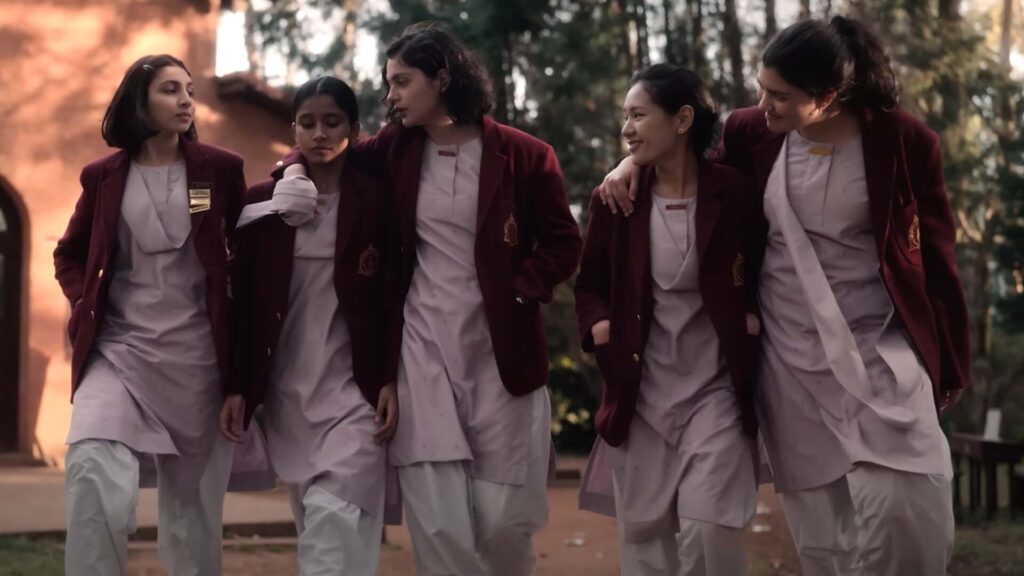No doubt Big Girls Don’t Cry, a web series created by Nitya Mehra and directed by Karan Kapadia, Sudhanshu Saria, Kopal Naithani and Mehra herself, has a noble message at heart. To empower women to accept themselves for who they are and be comfortable in their own skin. Unfortunately, it never sees the light of day due to some extremely superficial writing and surprisingly mediocre execution.
Big Girls Don’t Cry, streaming on Prime Video, follows a term in the life of high school students from a posh all-girls boarding school, who have an approachable yet stern principal, as they navigate through their friendships, relationships, identities and several ups and downs in a tale of growing pains. The underlying thought of the series is simple: . ‘Atmanam Vidhi’ (To Know Thyself) is an integral step in the process of self-growth. More so for women, who for years have been conditioned into believing that their own identity stems from that of the husband or their father or brother. The series’ recurring motif – ‘Big Girls Don’t Cry’, incidentally what this group of friends call their gang – is representative of an extreme patriarchal mindset that requires women to adjust and submit to the wishes of their husbands, families and society as a whole. The show aims to dispel this contrite notion.
The narrative structure of the series is linear for most of its runtime (except for a few flash-backs), but feels heavily manufactured. Manufactured to the extent of its plot points being highly predictable. The direction in which the story heads is extremely obvious, such that one knows how the series might end even before watching the final instalment. Due to the absence of depth, the entire story, over its seven episodes, glides at a pace that is neither tedious nor exciting, enabling the viewer to get a gist of all that goes on without ever needing to apply too much of their minds to it.
When dealing with subject matter, which has the power to initiate and make people aware of necessary change, it is essential to recognize that how the message is put forth is more important than the message itself. This is where Big Girls Don’t Cry stumbles badly. There is evident confusion in the makers’ minds – whether to tell a compelling narrative of self-actualization under the guise of a high school drama, or a superficial high school drama which lightly brushes on the many challenges faced by female adolescents. The result is a tried and tested, heavily mainstream treatment that feels part The Sex Lives Of College Girls (2021), part Mohabbatein (2000) and part Dead Poets Society (1989), imbibing none of the nuances present in differing magnitudes in each of those works.
Having said that, the sisterhood and friendship aspect of the series is somewhat more fleshed out. The highlight of the entire series is when the girls accidentally trip on poisonous berries they’ve consumed during a camping trip (Episode 4). Each character’s fears and insecurities of the past/present are addressed to a certain degree, with intra-group dynamics further revealed. Mehra has also taken care to ensure that the viewers get an understanding of the internal desires, aspirations and mindsets of female adolescents through her characters.
Each key character in the show represents a certain archetype. In Noor Hassan (Afrah Sayed) we see an ambitious girl, who will not stop at any cost to accomplish her goals (even ready to let go of her surname to acquire a US Visa). Leah Joseph (Avantika Vandanapu) is the headstrong, slightly egoistic and talented captain of her basketball team. She is confident and bold when it comes to social interactions and high-pressure matches yet highly unsure and embarrassed to come out of the closet. What could give room for vulnerability, complexity and deep character exploration of her queer identity comes across as little more than frankly token. Anandita ‘Pluggy’ Rawat (Dalai) is the erotica obsessed, goofy friend whose main goal seems to be losing her virginity. Once again, the makers throw very little dust on the inferiority complex she has regarding her weight. There is also Jayashree Chetri or JC (Lhakyila), a Nepalese princess, who must conform to tradition and age-old practices at the command and control of her grandmother. She finds respite and solace in her childhood friend Roohi (Aneet Padda). In fact, it is their characters and relationship dynamics that are more holistically chalked out. The equation shared between acting prodigy and recalcitrant problem-child Dia (Akshita Sood) and her nemesis-turned-friend Kavya (Vidushi) feels highly unnecessary and pretentious. In all honesty, it is Kavya’s character that is most inconsistent. A middle-class girl whose supportive parents send her to an elite school and the experiences she goes through in this new world could give interesting insights on class divisions present in the country. However, her character is reduced to the cliché trope of ‘middle class girl trying to fit in’. The school’s pragmatic and rational principal, Anita Verma (Pooja Bhatt), makes recurring appearances acting as an epitome of inspiration and a convenient moral compass to the ‘Big Girls Don’t Cry’ gang.
It is unfair to blame performances for inconsistent characterization and lax direction. The larger-than-life, punctilious production design and efficient, picturesque cinematography make the show visually appealing however. Strong mention must be made to the edit team for smartly salvaging and repairing narrative and character arcs the best they could, thereby giving the series an engaging pace and rhythm while providing some relief. The background score is overbearing, appearing at every tense or emotionally heavy moment; judicious, restrained application of the same would have provided for more impact and investment.
It is genuinely disheartening to see an idea so relevant and vital that couldn’t realise its own potential. That said, Big Girls Don’t Cry is definitely a step which could pave the way for more such stories to be told, hopefully evolving for the better over time.
Hindi, English, Drama, Color


